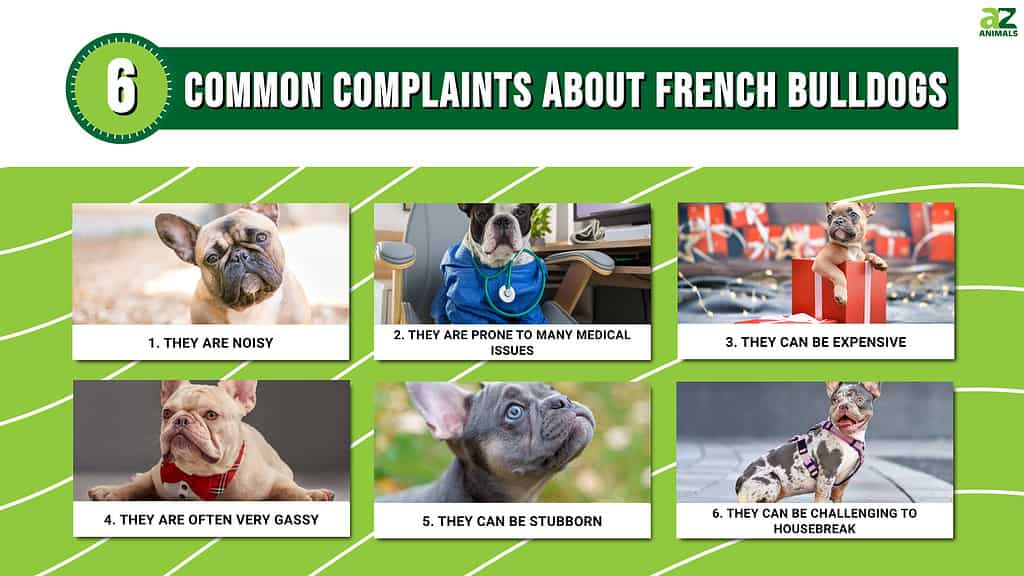The French bulldog has officially been named the most popular dog breed in the United States. It’s no wonder these adorable pups have taken the world by storm, but with so many new French bulldog parents out there, a few common complaints are starting to make the rounds.
So, is the French bulldog a troublesome breed? Let’s introduce you to six common complaints about the popular French bulldog!
Meet The French Bulldog!

©Firn/Shutterstock.com
The French bulldog is a canine friend unlike any other! Their large ears and compact bodies will have you swooning, and their comical personalities will have you giggling each day! It’s no wonder this friendly and playful pup has gained so much popularity over the years, leading to its eventual crowning as the most popular dog breed in the United States.
Though the French bulldog has many wonderful qualities, the breed does possess quite a few troublesome traits. It’s important to be aware of both the good and the bad of a breed before you welcome them into your family, so today we will break down the common complaints that Frenchie parents have!

6 Common Complaints About The French Bulldog

©Mary Swift/Shutterstock.com
#1 They Are Noisy
The French bulldog is bred to have a short nose and flat face. These unique features are part of what makes the French Bulldog so adorable, but they also lead to some noisy breathing. The French bulldog often suffers from a condition known as brachycephalic airway syndrome due to their facial structure, meaning their airways are often restricted. This makes it more challenging for them to breathe properly. French bulldogs will often snort loudly when playing or sleeping, so it’s something to keep in mind if you want to bring a Frenchie into your home.
#2 They Are Prone To Many Medical Issues

The French bulldog is no stranger to the vet’s office. French bulldogs are prone to a variety of troubling medical complications, ranging from respiratory issues to irritating skin allergies. Some of the most common health issues in the French bulldog include:
- Breathing difficulties
- Increased risk of overheating
- Hip dysplasia
- Elbow dysplasia
- Skin allergies
- Ear infections
- Skin infections
- Cherry eye
- Dry eye
- Difficulty giving birth
- Cardiac disease
As you can see, the French bulldog has quite a few health predispositions. Their facial and body structure has put them at risk of a variety of complications, so this is something all future Frenchie parents should be aware of.
Amy Nicole Lewis, a veterinarian with Worldwide Veterinary Services told A-Z Animals that French bulldogs are frequent flyers at most animal clinics. French bulldog parents should be aware of how expensive these medical issues can be over time, and how essential it is for French bulldog parents to enroll their Frenchie in a pet insurance plan the moment they adopt them. Pet insurance will always come in handy for French bulldog owners.
#3 They Can Be Expensive

Pet insurance can alleviate the financial burden of owning a French bulldog, but you will typically need to pay their vet bills upfront.
©iStock.com/Firn
As we mentioned above, the French bulldog is predisposed to a variety of medical complications. It is highly likely that your French bulldog will suffer from a few of the health complications listed above, and this can lead to expensive vet bills. While all dog breeds can find themselves in need of vet care, the French bulldog is notorious for requiring frequent vet visits. Pet insurance can alleviate the financial burden of owning a French bulldog, but you will typically need to pay their vet bills upfront.
#4 They Are Often Very Gassy

French bulldogs are known to have sensitive stomachs that can be thrown off with even the smallest of diet changes or stress.
©Vutravee Charuvatana/Shutterstock.com
The French bulldog is known for being very gassy. The first reason why they are so prone to gas is because of their unique facial structure. Many short-faced breeds will gulp air as they eat, leading to excessive amounts of air within their digestive tract. This air will be removed from their body in the form of frequent gas.
Not only does their facial structure increase their risk of frequent gas, but their sensitive stomachs put them at risk as well. French bulldogs are known to have sensitive stomachs that can be thrown off with even the smallest of diet changes or stress, and this can cause your pup to experience some flatulence.
#5 They Can Be Stubborn

French bulldogs will require a consistent training program that is highly engaging.
©Michael Reilly/Shutterstock.com
The French bulldog is known for being incredibly stubborn. While their sassy nature can be adorable at times, it can lead to some complications throughout their obedience training process. For this reason, French bulldogs will require a consistent training program that is highly engaging. They also do best with positive reinforcement style training that offers plenty of treats and praise.
#6 They Can Be Challenging To Housebreak

The best way to help your Frenchie succeed is by implementing a set routine each day.
©Firn/Shutterstock.com
French bulldogs can be more challenging to housebreak. It can take anywhere from four to six months of potty training to get your Frenchie on track, so this is something you will need to be aware of when diving into the potty training process. The best way to help your Frenchie succeed is by implementing a set meal routine each day, taking them outside multiple times a day (especially after resting or eating), and remaining firm and consistent with your training.
Is The French Bulldog The Right Dog For Me?
With the complaints that we discussed about the French bulldog aside, the French bulldog can still be a wonderful addition to many homes. They are goofy, playful, friendly, and absolutely adorable! As long as you are prepared for the complaints we discussed above, then you can be ready for all the unique experiences that come along with being a Frenchie parent!
Summary of 6 Common Complaints About French Bulldogs
| Number | Complaint |
|---|---|
| 1 | They Are Noisy |
| 2 | They Are Prone To Many Medical Issues |
| 3 | They Can Be Expensive |
| 4 | They Are Often Very Gassy |
| 5 | They Can Be Stubborn |
| 6 | They Can Be Challenging To Housebreak |
The photo featured at the top of this post is © Lined Photo/Shutterstock.com
Ready to discover the top 10 cutest dog breeds in the entire world?
How about the fastest dogs, the largest dogs and those that are -- quite frankly -- just the kindest dogs on the planet? Each day, AZ Animals sends out lists just like this to our thousands of email subscribers. And the best part? It's FREE. Join today by entering your email below.
Thank you for reading! Have some feedback for us? Contact the AZ Animals editorial team.






